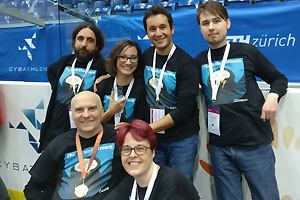10 October 2016
Essex team scoop medal in landmark world ‘bionic Olympics’

The Essex BrainStormers team.
Essex researchers were today celebrating bringing home a medal in the world’s first ‘bionic Olympics’ – Cybathlon.
The University’s BrainStormers team, led by PhD student Ana Matran-Fernandez, came third in the Brain Computer Interface Race where ‘pilots’ had to control a video game just with their thoughts.
“We are very happy that all the hard work has paid off and I want to thank all the BrainStormers team for their involvement,” said Ana. “It has been a real pleasure to take part in such an amazing event and I'd like to thank the organisers of Cybathlon for their efforts and congratulate them on the result - pushing technology further through a flawless competition. We are also really grateful to our sponsor BioSemi and to all those who supported us through crowdfunding.”
BrainStormers were one of the original projects on Click – the University’s crowdfunding platform. In five weeks, they raised £3,016 towards the costs of going to Cybathalon in Zurich.
James Martin, from the Advancement Office, said: “We are incredibly proud of Ana and her team, and use their crowdfunding project as a success story to students today – we wouldn’t be the world’s most prolific University crowdfunding platform without them!”
Cybathlon highlighted how people with physical disabilities can be helped by novel technological aids in their everyday activities. The event, which attracted 50 teams from around the world, involved individuals competing side-by-side in six demanding disciplines, using the latest assistive technologies including electronic arms and legs, robotic exoskeletons, powered wheelchairs, electrical muscle stimulations and brain-computer interfaces.
The Brainstormers ‘pilot’ was David Rose, who was paralysed from the shoulders down 29 years ago when he broke his neck in a diving accident. His race involved him moving an avatar in a computer game using thought commands. He wore a special cap covered in electrodes which recorded the signals from the brain and sent them to the computer, where they were interpreted as commands.
Speaking after the race David said: "The emotions at the end of The Brain Computer Interface Race were truly amazing. Two years of incredibly hard work from the whole team had paid off as we were taking a bronze medal home. I sat back and looked at my team mates Ana and Davide and our faces said it all; happiness, joy; too many emotions to describe.
“I am so proud to have been part of The BrainStormers Team. Seeing the dedication, commitment and time that this group of PhD-led students have devoted to the Cybathlon is inspirational. We have proved ourselves against the top universities and laboratories in the world. We have brought a bronze medal home to the United Kingdom. Most importantly this will bring technology forward to improve the lives of people with disabilities across the world.”
...more news releases